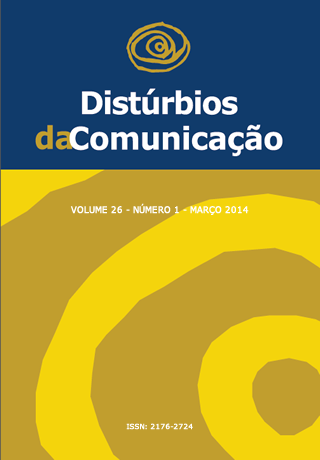Desempenho auditivo e comportamentos atípicos em crianças usuárias de implante coclear
Palavras-chave:
perda auditiva, transtorno autístico, implante coclear.Resumo
O diagnóstico diferencial entre a perda auditiva e o autismo se dá por meio dos testes audiológicos e da observação clínica do comportamento geral da criança. O comportamento da criança pode ser avaliado por meio de escalas, como o Autism Behavior Checklist (ABC). O objetivo deste trabalho é analisar se comportamentos atípicos associados à perda auditiva podem interferir no desenvolvimento das habilidades auditivas pós-implante coclear. Este é um estudo híbrido (retro e prospectivo) e observacional. Foram incluídas crianças com perda auditiva neurossensorial bilateral congênita severa e profunda, usuárias de Implante Coclear (IC) multicanal e uso sistemático do IC, por pelo menos 3 meses. Foram excluídas as crianças que apresentaram inserção parcial ou inadequada dos eletrodos; alteração nas impedâncias dos eletrodos; má formação da orelha interna e/ou nervo auditivo; transtorno do Espectro da Neuropatia Auditiva. Foram selecionadas 27 crianças. Obtivemos os limiares auditivos com Aparelho de Amplificação Sonora Individual (AASI) pré-implante, o desempenho auditivo por meio do inventário IT-MAIS/MAIS no pré IC e pós IC e os limiares auditivos com IC. Prospectivamente, as mães responderam ao Inventário de Comportamentos Autísticos (ICA). Não houve correlação significativa entre o ICA, a evolução dos limiares audiométricos e a evolução do IT-MAIS/MAIS. Observou-se que os limiares audiométricos melhoraram consideravelmente pós IC na média do grupo avaliado. O mesmo ocorreu com o questionário IT-MAIS/MAIS. Por meio do questionário ICA, obtivemos a presença de três sujeitos com pontuação considerada alterada. O desenvolvimento das habilidades auditivas pode ser esperado como resultado do IC em crianças com comportamentos gerais atípicos e surdez severa a profunda bilateral associada.
Downloads
Métricas
Downloads
Publicado
Edição
Seção
Licença
Copyright (c) 2014 Bruna Lins Porto, Débora Befi-Lopes, Maria Inês Couto, Carla Gentile Matas, Fernanda Dreux Fernandes, Ana Cristina Hoshino, Maria Valéria Goffi-Gomez, Ricardo Ferreira Bento, Robinson Koji Tsuji

Este trabalho está licenciado sob uma licença Creative Commons Attribution 4.0 International License.









